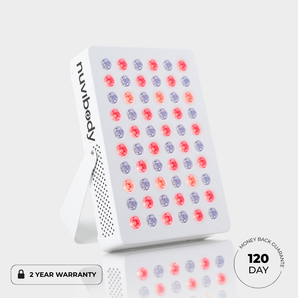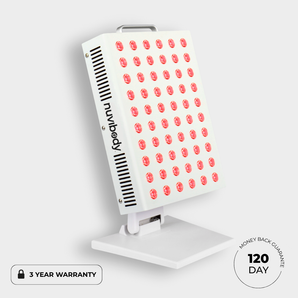Hormonal imbalance is a common problem in women, and it can cause a wide range of symptoms, from mood swings and fatigue to weight gain and irregular periods. Many women seek solutions to naturally address this imbalance, without relying on medications. But what really works? Below we discuss several proven natural methods for addressing hormonal imbalance in women and how they can improve your well-being.
What causes hormonal imbalance?
Hormonal imbalance can be caused by various factors. Life stage changes, such as menopause or perimenopause, play a significant role. Stress, poor diet, insufficient sleep, and exposure to environmental factors like chemicals can also disrupt the balance. Hormonal imbalance can lead to a range of symptoms, such as:
- Weight gain or difficulty losing weight
- Sleep disorders
- Irregular menstruation
- Fatigue and low energy levels
- Mood swings and anxiety
- Skin problems such as acne or dry skin
The good news is that there are a number of natural solutions that can help women manage these symptoms and restore hormonal balance.
1. Nutrition as a basis for hormonal health
A healthy diet is essential for restoring hormonal imbalance. Eating the right nutrients can support your body's hormone production and optimize their function. Focus on:
- Healthy fats : Omega-3 fatty acids, found in oily fish, walnuts, chia seeds, and flaxseeds, are essential for hormonal health. They help reduce inflammation and support hormonal function.
- Magnesium : This mineral is crucial for regulating hormonal function, especially when you're experiencing stress. Magnesium-rich foods like spinach, almonds, and avocados can help manage your stress levels and support hormone production.
- B Vitamins : Vitamins like B6 and B12 are important for balancing your hormones, and are found in foods like eggs, bananas, and whole grains.
- Fiber-rich foods : Fiber supports the detoxification of excess hormones like estrogen. Vegetables, fruits, whole grains, and legumes are excellent choices.
By adjusting your diet, you can not only help balance your hormones, but also increase your energy levels and improve your overall health.
2. Stress management and hormones
Stress is one of the biggest culprits when it comes to hormonal imbalance. When your body is under stress, it produces cortisol, the so-called "stress hormone." Chronically high cortisol levels can disrupt the balance of other hormones, such as estrogen and progesterone.
One of the most effective ways to manage stress is to regularly practice relaxation techniques such as:
- Yoga and meditation : These practices can help lower your cortisol levels and bring your body and mind into balance.
- Breathing Exercises : Deep breathing techniques can quickly calm your nervous system and reduce the production of stress hormones.
- Walking in nature : Simple exercise, especially in a quiet environment, can improve your mood and lower your stress levels.
By regularly reducing stress, you give your hormones the chance to stabilize.
3. Sleep: The Key to Hormonal Balance
A good night's sleep is crucial for restoring hormonal imbalances. Poor sleep can increase cortisol levels and disrupt the production of growth hormone and melatonin, leading to further hormonal imbalances.
For better sleep quality, try the following:
- Create a sleep-friendly environment : Provide a cool, dark, and quiet room. Limit the use of electronic devices before bed to support melatonin production.
- Regular sleep times : Go to bed and wake up at the same time every night to help your body find a consistent rhythm.
- Relaxation before bed : Try a relaxing activity, such as a warm bath or drinking herbal tea, to help put your body into sleep mode.
By optimizing sleep , you ensure that your body has time to fully recover and restore hormonal balance.
4. Herbs and supplements to support hormonal balance
There are several herbs and supplements known for their ability to support hormonal imbalance. Some of the most popular and proven effective options include:
- Vitex (chasteberry) : This herb is often used to increase progesterone production and may help relieve symptoms of PMS and menopause.
- Ashwagandha : This adaptogen helps lower the stress hormone cortisol and supports overall hormonal balance.
- Maca : Maca root is often used to increase energy and reduce hormonal fluctuations. It can also help regulate the menstrual cycle.
Before starting any herbs or supplements, it's important to consult a doctor, especially if you're taking medications or have specific health conditions.
5. Red light therapy as natural support
An interesting natural therapy that can help women with hormonal imbalance is red light therapy. This therapy uses specific wavelengths of light to stimulate cellular processes in the body, which helps improve overall health, reduce inflammation, and promote healing.

Red light therapy can be especially helpful for women experiencing hormonal fluctuations due to menopause or perimenopause. Regular use of red light therapy can improve energy levels, reduce inflammation , and even improve skin condition . It can also promote better sleep, which in turn helps restore hormonal balance.
Want to know how to integrate red light therapy into your routine? Consider purchasing a high-quality red light therapy lamp specifically designed for home use. This allows you to easily and effectively reap the benefits of this therapy.
Conclusion: Natural solutions for hormonal balance
Hormonal imbalance doesn't have to be a long-term problem. By eating a healthy diet, managing stress, getting enough sleep, and using targeted herbs and supplements, you can significantly improve your hormonal balance. Furthermore, adding red light therapy to your daily routine can provide powerful, natural support to boost your energy levels and promote your overall well-being.
Are you struggling with hormonal imbalance? Start implementing these natural solutions today and give your body the chance to regain its balance. Remember to be consistent and patient; hormonal changes take time. However, with the right approach, you can regain control of your health.
Frequently asked questions and answers
1. What are the first signs of hormonal imbalance in women?
Hormonal imbalance in women can manifest itself in various ways. The most common signs are:
- Irregular periods or missed periods
- Mood swings, irritability or anxiety
- Fatigue, even after a good night's sleep
- Weight gain or difficulty losing weight
- Skin problems such as acne or dry skin
- Increased hair growth or hair loss
- Poor sleep quality or insomnia
If you experience several of these symptoms, it could be a sign of hormonal imbalance. It's important to take these changes seriously and consult a doctor for an accurate diagnosis.
2. How can nutrition help restore hormonal imbalance?
Diet plays a crucial role in regulating hormones. Certain foods help improve hormone production, while others can disrupt the balance.
- Healthy fats such as omega-3 fatty acids support hormone production.
- Magnesium helps regulate cortisol (the stress hormone).
- Fiber supports the elimination of excess hormones, such as estrogen, from the body.
Incorporating a balanced diet with these nutrients can improve your hormonal health and reduce symptoms of imbalance.
3. Can stress cause hormonal imbalance?
Yes, chronic stress directly impacts hormonal balance. Stress increases cortisol production, which in turn can disrupt other hormones like estrogen, progesterone, and thyroid hormones. Long-term stress can therefore lead to menstrual cycle disruption, weight gain, fatigue, and other symptoms of hormonal imbalance.
Reducing stress through relaxation techniques such as yoga, meditation, and breathing exercises can help rebalance hormones.
4. How can red light therapy help with hormonal imbalance?
Red light therapy stimulates the mitochondria in your cells, which increases energy production and reduces inflammation. This can be particularly helpful for women experiencing hormonal fluctuations, such as during menopause or perimenopause. It can help improve your energy levels, support your skin condition, and even promote better sleep patterns.
Regular use of a red light therapy device can help restore hormonal balance by reducing the production of stress hormones and improving overall cellular health.
5. Should I see a doctor immediately if I suspect a hormonal imbalance?
While natural remedies and lifestyle changes can certainly help, it's always a good idea to consult a doctor if you suspect a hormonal imbalance. A doctor can perform tests to determine if there's an underlying condition, such as polycystic ovarian syndrome (PCOS), a thyroid problem, or menopause. Once the cause is determined, a doctor can help you develop a treatment plan that may include both natural remedies and medical treatment.
6. How long does it take to see natural solutions for hormonal imbalance?
The time it takes to notice improvements depends on several factors, such as the severity of the hormonal imbalance and lifestyle changes. In most cases, you can see improvement within a few weeks to months through a healthier diet, better sleep habits, and stress management. Patience is key, as hormonal changes take time to stabilize.
7. Can hormonal imbalance lead to fertility problems?
Yes, hormonal imbalances can affect fertility. Irregular ovulation due to hormonal imbalances can make it difficult to conceive. Women who are having trouble conceiving should have their hormone levels tested to identify underlying problems. Restoring hormonal balance can improve fertility, but this may sometimes require medical intervention.
8. What are the risks of ignoring hormonal imbalance?
Ignoring hormonal imbalances can lead to long-term health problems. In women, chronic hormonal imbalances can contribute to conditions like osteoporosis, cardiovascular disease, and even cancer (such as breast cancer, which is often influenced by estrogen fluctuations). It's important to take symptoms of hormonal imbalance seriously and take action promptly to prevent further complications.



















